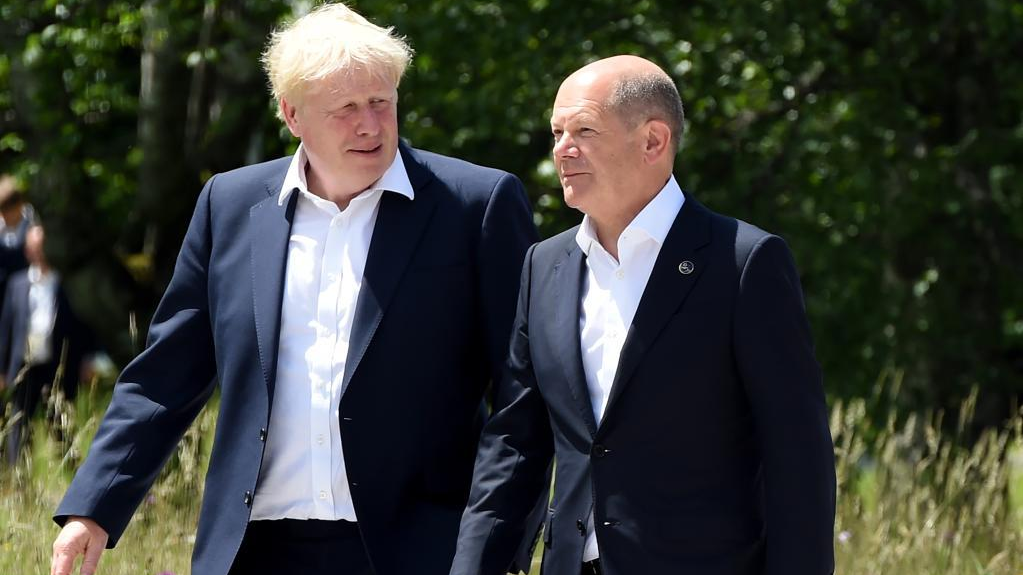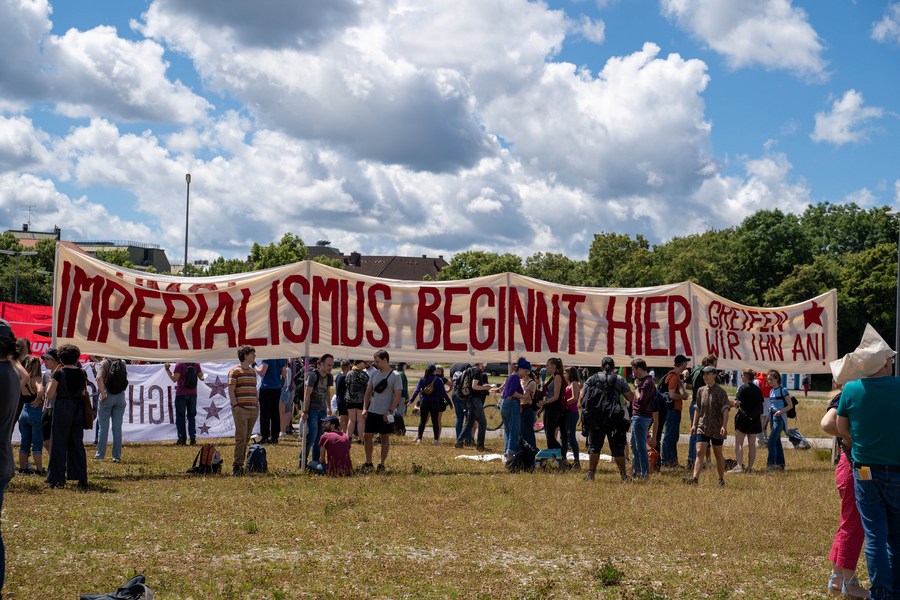
British Prime Minister Boris Johnson (L) talks with German Chancellor Olaf Scholz during the Group of Seven (G7) Summit in Schloss Elmau, south Germany's Bavarian Alps, June 26, 2022. [Photo/Xinhua]
By Jonathan Arnott
As the new German chancellor, Olaf Scholz has not got off to a good start. That is par for the course as after the end of Angela Merkel's era, it would have been difficult for whoever took the role next. He could expect, at the very least, to be compared with Angela Merkel on a regular basis, and must avoid being seen in her shadow.
It was, for Scholz, the worst time to take over. Following 16 years of economic stability under Merkel, Scholz has had to contend with the COVID-19 pandemic, the Russian"special military operation" in Ukraine, and an inflation and cost-of-living crisis. For Germany, economic competence is a prized asset among politicians. Furthermore, he has faced substantial criticism within the European Union for"not doing enough" to support Ukraine.
The2022 G7 summit is therefore important for Scholz, given that Germany currently holds the rotating presidency of the G7. It is an opportunity for him to seek to change his low approval ratings, and this summit is more important than most. This year's summit has an unusually packed agenda, which can basically be boiled down to two things. It's about the money. And it's about Russia. Even those two things are connected.
From China's perspective, the Partnership for Global Infrastructure and Investment (PGII) – which was first unveiled in 2021 – will be of interest. It is the West's attempt to copy (or challenge) China's Belt and Road Initiative. The idea may have been mooted before, but now they need the funding for $600 billion in infrastructure projects. However, while China has focused on physical infrastructure and connectivity, the G7 envisages projects aimed at"tackling climate change, improving global health, achieving gender equity and building digital infrastructure." There is nothing wrong with such goals in and of themselves, but I do wonder whether they will have the same appeal as a more direct"bricks and mortar" approach.
The consequences of the conflict in Ukraine will also have an impact on some of the world's poorest countries. Given Ukraine's huge grain exports (on average around 50 million tonnes per year), the current hiatus is having a disproportionate effect on global food prices. There is a real risk that a continuation of the current situation could lead to famine. At the same time, inflation is impacted by the current high oil prices. The G7, and in particular U.S. President Joe Biden, would like to impose a price cap on Russian energy. That cannot necessarily be done with ease. They can only distort the market to the extent to which they control that market, and given that India and China would not be obliged to comply, it is unclear whether a price cap would have any impact on Russia.

A demonstration against G7 summit in Munich, Germany, June 25, 2022. [Photo/Xinhua]
Russian energy giant Gazprom would act in Russia's strategic interests rather than the West's, following its"our product, our rules" strategy. Likewise, it is unclear how significant a difference an expected ban on imports of Russian gold will actually make. Gold is freely traded around the world, and Russia could easily continue to sell to third parties. As commodities and currencies research analyst Megh Mody said, for India"It will be an opportunity to see if like crude, gold can be available in rubles. If it happens, India can receive gold at a discounted rate."
The G7 continues to make a staunch political defence of Ukraine, with British Prime Minister Boris Johnson saying that the"price of freedom is worth paying." Ukrainian President Volodymyr Zelenskyy has again urged the West to"do more" to step up sanctions against Russia and"end the war by winter."
However large and powerful the G7 might be, particularly given that the EU also has an unofficial seat at the table, it does not have the clout to completely control world markets. There is no power in existence able to do that. The conflict of attrition in Ukraine will continue, with all the state actors who are involved in any way paying a high price. Johnson's words sum up the G7's approach: They are happy to pay that price to stall what they see as"Russian aggression." A competitive economic advantage might well accrue to those countries which do not join the sanctions regime against Russia, and the G7 is accepting of that.
The two main issues at the G7 are money and Russia. They are indeed linked, and from the West's perspective both will point to policies in opposite directions. In particular for German Chancellor Scholz, who is in the spotlight at present, the political tightrope is a difficult one to walk. I expect to see a great show of solidarity, some eye-catching financial announcements including on the PGII (which will require detailed evaluation later) and significant rhetoric against what will be described as"Russia's war in Ukraine."
Jonathan Arnott is a former member of the European Parliament.

 中文
中文



